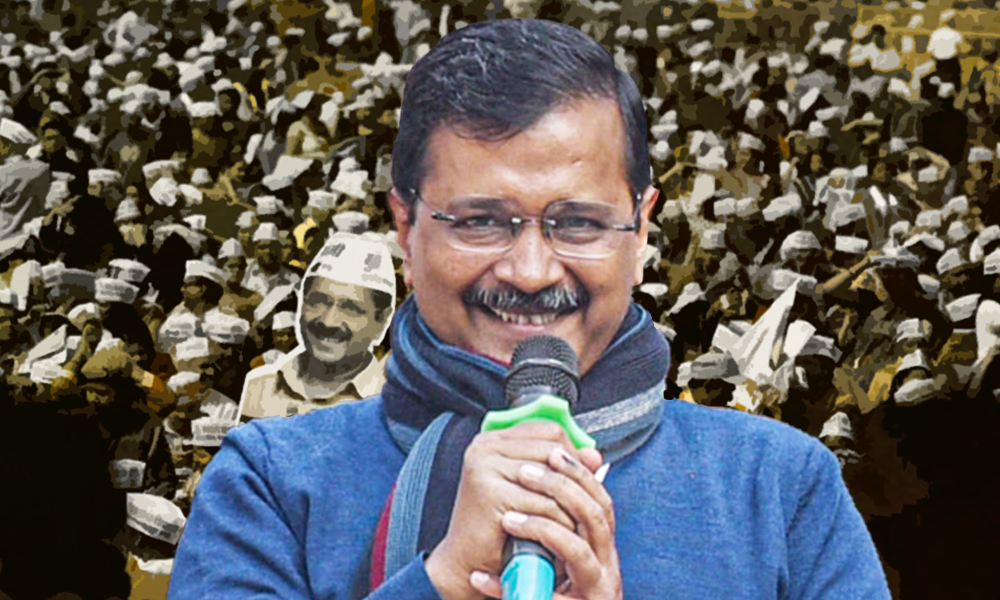Elections Over, Its Time For Aam Aadmi Party To Walk The Talk
India, 12 Feb 2020 2:53 PM GMT
Editor : Navya Singh |
Navya writes and speaks about matters that often do not come out or doesn’t see daylight. Defense and economy of the country is of special interest to her and a lot of her content revolves around that.
By : Reethu Ravi
Reethu, a story teller, a person often found between the pages of a book or contemplating the nuances of life.
In its third run, how the party delivers on its promises is going to be crucial for AAP. The Logical Indian will be keeping a close eye on the governance in Delhi.
In a landslide victory, Arvind Kejriwal-led Aam Aadmi Party (AAP) won 62 out of 70 seats in the Delhi Assembly Elections 2020. For the second consecutive time, AAP crushed their arch-rivals Bharatiya Janata Party(BJP). As celebrations continue with much fervour of a not-so-surprising victory, its time for AAP to walk the talk.
In the run-up to this year's assembly elections, AAP offered a number of freebies to the voters, including 200 units of free electricity and 20,000 litres of free water per month for the next five years. Hence, it comes as no surprise that many of the party's rivals, especially BJP, alleged that AAP is using freebies to lure the voters.
Soon after AAP's victory, SC Vats, BJP's Shakur Basti candidate, said: "Providing air conditioners, laptops and printers to Resident Welfare Association (RWAs) and a large amount of freebies to people by AAP a few months before the elections to attract voters was the major factor that adversely affected the vote share."
On similar lines, Haryana Cabinet Minister Anil Vij took to Twitter and said, "Dilli ke chunav me mudde harr gaye, muftkhori jeet gayi (In Delhi Assembly elections, issues lost, freebies won)."
दिल्ली के चुनाव में मुद्दे हार गए, मुफ्तखोरी जीत गई ।
— ANIL VIJ MINISTER HARYANA (@anilvijminister) February 11, 2020
To keep up with its credibility, AAP has no choice but to deliver on its promises. While offering freebies in itself is not problematic, Kejriwal's promise of 'Vikas' come at a time the Indian economy is doing poorly. With the Delhi government's expenditure on health and education sector already high, it remains to be seen as to how it will bear the additional financial burden.
Furthermore, some of the promises made in 2015 manifesto are yet to be fulfilled. While the party had promised 8 lakh jobs in the 2015 manifesto, this time around, it remained silent on the topic.
However, it once again promised a pollution-free Delhi, an assurance they had made in 2015 as well. In its third run, how the party delivers on its promises is going to be crucial for AAP.
In addition, AAP will also be faced with several political challenges. With the protests against the new Citizenship Act still rampant in the country, AAP can no longer shy away from taking a clear stand on CAA, NPR, and NRC.
With the people expecting more now, in its third term, AAP needs to buckle up and go beyond the ambit of "freebies".
BJP Gaining Ground
The election results may have come as a major defeat for BJP, it has significantly gained in numbers compared to the 2015 polls. Despite BJP showcasing perhaps its most communal and hate-driven election campaigns, the support for the party has significantly grown in the national capital.
The BJP not only won eight seats, five more than the previous election, the BJP-led alliance, comprising of Janata Dal (United) and Lok Janshakti Party (JLP), secured a combined vote share of nearly 40 percent. This is notably higher than their vote share of 32.3 in 2015. While this increase in vote share may not be poignant, BJP's vote bank has indeed increased.
It is also imperative to note that, in the 2019 Delhi Lok Sabha Polls, AAP was at the third position with a meagre 18 per cent vote share and no seats, compared to its 32.9 per cent in 2014. Meanwhile, BJP had won all the seven Lok Sabha seats with a whopping 56.58 per cent vote share. These figures show that people vote differently at the Centre and in the states.
AAP Needs More Than Just Kejriwal
While AAP may have established itself in the national capital while banking on the popularity of Arvind Kejriwal, the party is still far from the status of a national party. So is Kejriwal from emerging as a national leader. While it has created a space for itself in Punjab, it's not the same case in other states.
AAP's victory in Delhi is attributed to development work and not a strong political strategy and hence, when it comes to other states, AAP lacks a strong foothold. To establish itself across India, the party needs more prolific leaders. One of the reasons BJP lost in Delhi is its failure in projecting a strong chief ministerial candidate as an alternative to Kejriwal, the same may prove true for AAP in other states.
Also Read: Opinion: 'Development Over Divisive Politics': Delhi Rejects BJP's Hate Campaign For AAP
 All section
All section















